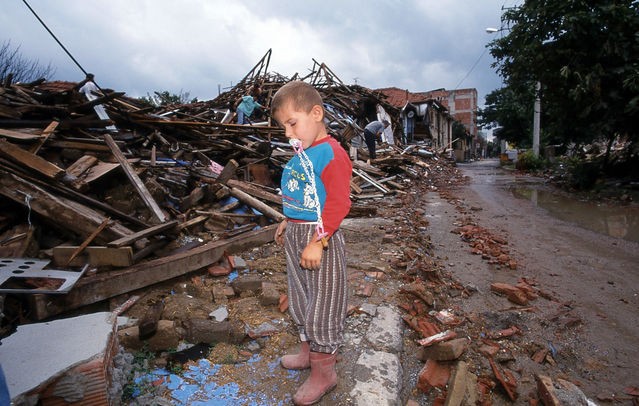 Earthquake aftermath in Yalova, Turkey, reflecting on tragedy and resilience
Earthquake aftermath in Yalova, Turkey, reflecting on tragedy and resilience
Yalova, northwestern Turkey, August 17, 1999, following the 7.6 magnitude İzmit earthquake. Source: Sadik Gulec | Shutterstock
“We could bear nearly any pain or disappointment if we thought there was a reason behind it, a purpose, to it.” — Rabbi Harold Kushner, When Bad Things Happen to Good People.
When faced with life’s harsh realities, the question “Why Do Bad Things Happen To Good People?” echoes through human history. This timeless query delves into the heart of our struggle to understand suffering, injustice, and the seemingly random nature of adversity. My wife, Karin, a pragmatic and grounded individual, faced this question not as a philosophical debate, but as a personal battle. In 2005, at the age of 38, she received a diagnosis of aggressive, life-threatening cancer. Unlike some, Karin never questioned, “Why me?” or pondered cosmic injustice. When asked about grappling with these questions, her straightforward response was, “Why not me?”
We were no strangers to life’s challenges. However, Karin’s diagnosis was a crisis of a different magnitude. Yet, neither of us harbored illusions of immunity to hardship. Working in helping professions, we had witnessed considerable suffering in our careers and among loved ones. Adversity, in a way, felt almost inevitable. The notion that we were somehow exempt from misfortune seemed unrealistic. For years following the diagnosis, uncertainty loomed, and we braced for the worst. Fortunately, through a combination of fortunate circumstances and medical advancements, we navigated through it. Cancer, however, casts a long shadow, and subsequent scares have reminded us of its persistent presence.
During the initial, vulnerable phase of Karin’s illness and treatment, I found myself yearning for reassurance, wanting to believe in a benevolent cosmic plan. However, my psychiatric practice had instilled in me a keen awareness of denial and wishful thinking as defense mechanisms. I had observed countless individuals confronting severe threats, resorting to these mechanisms, especially when fate seemed dictated by arbitrary factors that mocked the significance of their lives. I recognized in myself a struggle to fully accept the extent to which randomness governs our existence. This experience deepened my interest in how patients grapple with life’s inherent unpredictability and their perceived lack of control when bad things happen. I’ve frequently observed how individuals invest their precious time and energy in activities that offer a semblance of control, such as restrictive diets, unproven alternative treatments, and superstitious rituals, when faced with the question of why bad things happen to good people.
The Natural Human Response: Searching for Meaning
As humans, we are inherently meaning-seeking creatures. We naturally process events by evaluating their personal significance – is it beneficial or detrimental to us? This tendency often leads us to attribute deliberate intention to events, interpreting them through a self-centered lens. Furthermore, we are storytelling beings. Our minds are wired for coherent narratives, grand schemes with purpose and resolution. We crave stories where events unfold for specific reasons, where everything has a point. Randomness is unsettling to our innate desire for order.
Therefore, “Why did this happen?” and “Why me?” are instinctive questions when facing sudden adversity, like a cancer diagnosis. “What did I do to deserve this? Did I cause it?” are common self-recriminating thoughts. Many grapple with the notion of divine punishment for past misdeeds or search for a hidden, higher purpose in their suffering, seeking a lesson within the pain. In my psychiatric practice, I’ve observed the profound impact of believing life events are intentional. This belief is a double-edged sword, offering comfort and reassurance, yet also paving the way for disillusionment, anguish, and a sense of divine abandonment when confronted with cruel misfortune. The human quest to understand why bad things happen to good people is deeply intertwined with our need for meaning and control in a world that often feels chaotic.
The Theological Dilemma: Theodicy
Theodicy, in theology, grapples with the challenge of reconciling the existence of evil and suffering with the concept of a benevolent, omnipotent, and omniscient God. The central question is stark: “Why do terrible things happen in a world governed by an all-powerful, all-knowing, all-good God?” How can a deity possess these attributes and yet allow the pervasive suffering of good people, often with such intensity? As Nobel laureate physicist Steven Weinberg noted, “If there is a God that has special plans for humans, then He has taken very great pains to hide His concern for us.”
Rabbi Kushner, in his influential book When Bad Things Happen to Good People, proposed a compelling, albeit controversial, solution: relinquishing the belief in God’s omnipotence. He stated, “I believe in God. But I do not believe the same things about Him that I did years ago… I recognize His limitations. He is limited in what He can do by laws of nature and by the evolution of human nature and human moral freedom.” Kushner further suggested that the bad things that befall us are inherently meaningless upon occurrence. However, he argued that we can redeem these tragedies from senselessness by imbuing them with meaning. He proposes shifting the focus from “Why me?” to “Now that this has happened, what am I going to do about it?”. This perspective reframes suffering not as divine punishment or a test, but as a reality to be navigated and imbued with personal significance.
The Scientific Perspective: Embracing Randomness
From a scientific standpoint, the concept of God, in any iteration, becomes an unnecessary layer in explaining the universe and its contents. A fundamental tenet of modern science is the assertion that:
The universe has no inherent purpose or design.
It is a counterintuitive notion, yet scientifically plausible, that the universe, with its intricate complexity, life, and consciousness, arose spontaneously and without guidance. Science, in its essence, seeks to unravel how such astonishing complexity could emerge from fundamental randomness and simplicity, perhaps even from nothingness.
Contemplating the vastness of the universe and the question of purpose. Source: Sadik Gulec | Shutterstock
Once this scientific conclusion is fully grasped, the enigma of why bad things happen to good people dissolves. Adversity, from this perspective, arises from the same natural laws governing all events. There is no inherent distinction in the causation of events we label “bad.” The question then reframes itself: Why would bad things not happen to good people? Or, in simpler terms, “Sh*t happens.” Adopting a secular worldview involves recognizing that meaning and purpose are human constructs, not inherent properties of events, unless those events stem from intentional human or animal action.
Accepting Randomness and Finding Meaning
The notion of life’s randomness can be unsettling, yet paradoxically, it can be emotionally liberating. Accepting randomness frees us from unwarranted self-blame. It empowers us by shifting the locus of control from external, inexplicable forces to our own responses and actions. When bad things happen, understanding the role of chance can mitigate feelings of personal culpability or divine retribution. Instead of searching for elusive reasons or dwelling on cosmic injustice, we can focus on navigating the present reality and shaping our response.
This acceptance doesn’t negate the pain of suffering, but it alters our perspective. It allows us to move beyond the futile quest for inherent meaning in tragedy and towards actively creating meaning in its aftermath. It underscores the importance of resilience, adaptability, and focusing on what we can control – our reactions, our choices, and our connections with others.
Finding Purpose in a Meaningless Universe: Human Connection and Kindness
Once we reconcile ourselves to the universe’s indifference, the significance of human connection becomes even more profound. We realize our reliance on each other in the face of adversity. Our collective capacity to alleviate suffering becomes paramount. Acts of support and empathy in times of need not only provide tangible assistance but also convey a powerful message: that individuals matter and their experiences resonate with others. Kindness, in this context, becomes a potent source of meaning in our own lives, demonstrating our impact on others.
As a therapist, I often emphasize to patients the personal impact their suffering has on me within our therapeutic relationship. For cancer patients facing less favorable outcomes than Karin, the therapeutic focus shifts from reassurance to defining their legacy – the impact of their lives on others. I express gratitude for their shared experiences and the profound lessons they impart about the human condition. I assure them that these lessons will be carried forward, shared with future patients and students, creating a ripple effect of meaning and connection.
In the crucible of Karin’s cancer journey, we were deeply touched by the outpouring of kindness and care we received. This experience reaffirmed our faith in humanity. While acknowledging the existence of uncaring and even brutal individuals, the overwhelming majority of people are capable of compassion, especially when they can connect with another’s perspective and predicament.
The universe may lack inherent purpose, but we, as humans, do not. We imbue life with value and meaning. Humanity’s capacity for care and connection, even in a seemingly indifferent universe, is a testament to our resilience and our ability to create purpose where none may inherently exist. People can and do care, even if the universe doesn’t. This capacity for empathy and action in the face of suffering is a powerful answer to the question of why bad things happen to good people – it is in our response, in our shared humanity, that we find meaning and purpose.

